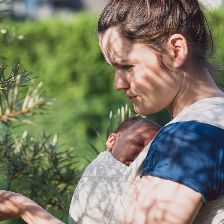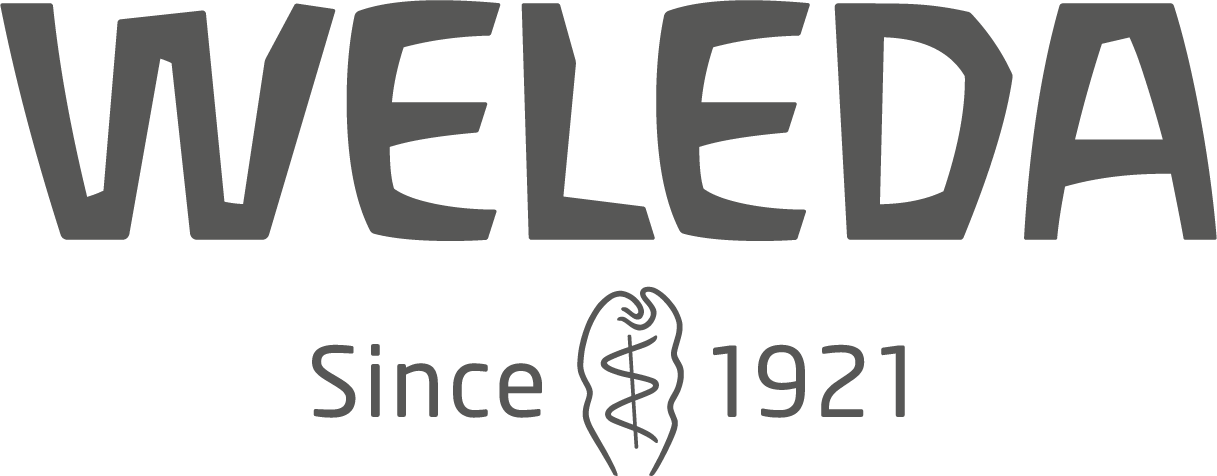
Weaning Your Baby on to Solid Foods
Once they have reached around six months of age, babies are ready for their first solid foods. The best ingredients are fresh foods, patience and a lot of time.
During their first half-year of life, babies grow faster than any other time afterwards. Everything that they need is contained in the mother’s breast milk. Babies that are not breastfed can get the nutrients they require from infant formula. During this time, babies develop the physical requirements they need to gradually start eating solid foods at the dining table.
After being able to hold their heads up themselves , they start sitting upright on their parent’s lap with a bit of support on the lower back. As they learn to roll over, they also develop their tongue motor skills, so that they can handle different foods in new shapes and textures. Soon babies begin to hold things in their hand and put them in their mouth. The tongue thrust reflex, which pushes foreign bodies out of the mouth gradually disappears. For most babies, these milestones occur by the time they have reached six months of age; in a few cases, children are ready a little earlier. Solid foods should not be introduced before the fifth month of life.
Food should be freshly prepared
Once parents feel their child is ready for first solids, they can offer a small amount two or three times a day, which the baby can take in its hand, or which they can carefully feed their baby using a spoon. At the beginning, the primary aim is for baby to discover and try out new foods. These can include steamed vegetables or grain porridge with fruit. The food should be freshly prepared and contain no added salt, sugar or preservatives. Raw milk products and honey are unsuitable for infants due to the risk of infection; nuts or other foods that baby could easily choke on should also be avoided. With these few exceptions in mind, the variety your baby can experience at the table is virtually unlimited.
Indeed, there is a broad selection of healthy foods that seem to positively impact the development of tolerance to potentially allergenic foods. No special rules apply initially to babies with an increased risk of allergy. Their primary source of nutrition should still be milk, which is why breastfeeding or formula should be provided as needed and not be restricted. Breast milk remains a valuable and important source of nutrition, even after baby’s first birthday.
Stress and pressure have no place at the table
Sharing a meal with the family in a pleasant atmosphere helps to teach your child positive eating habits. It is also particularly important that babies are allowed to determine for themselves how fast and how much they eat. Stress and pressure have no place at the dinner table. Every child learns to walk at their own developmental pace, and this is no different when they learn to eat, which should be supported mindfully. Parents should offer their child a well-balanced and healthy selection of foods, but they should not dictate how or how much is eaten. Some babies want to take their food into their own hands from the outset, while others enjoy being lovingly fed while sitting on their parent’s lap. The parents’ duty is to attentively accompany their child along its individual path.
Checklist: Foods to avoid when weaning Your Baby
- Avoid raw animal foods such as eggs, fish and meat. Raw milk is also unsuitable due to the risk of illness from dangerous bacteria such as salmonella, for example.
- Honey and maple syrup should not be ingested, due to the risk of botulism caused by Clostridium botulinum bacteria.
- No kind of caffeine or alcohol should be present in the diet of babies and children in general.
- Fish with bones is inappropriate, as well as lettuce, which can stick to the roof of the mouth.
- Unprocessed, whole nuts are dangerous; baby might inhale them through the mouth or nose or choke on them. However, they can be consumed by babies if they are processed accordingly, i.e. milled and baked in other foods.
- No salt – it should only be used in boiling water.
- No sugar additives, such as maltose, dextrose, fructose and maltodextrin
- No thickening agents or flavourings – these additives should also be avoided in jarred baby food.
- Also avoid chocolate and cocoa, which might be present in pre-cooked cereals.
Recipes for fingerfood, easy to prepare
- Wash and peel vegetables such as squash, carrots, parsnips, courgettes and broccoli. Carrots and parsnips should be rinsed again after peeling.
- Cut vegetables into strips, around 10 cm long. The pieces should be long enough that they stick out when held in your baby’s fist.
- Fill a pot with some water, insert a strainer, add the vegetables and cover with a lid. Bring the water to a boil. Steam the vegetables until soft. Alternatively, place the vegetables directly in the pot, fill with just enough water to cover them and boil with the lid on.
- Quickly preparing and gently cooking the cleaned vegetables preserves more of their valuable nutrients.
- Cooking time is 8-10 minutes, depending on the type of vegetable.
- Offer your baby the soft-boiled vegetable sticks, or use a hand-blender to mash
Also good on the go: Banana and apple muffins
What you need:
150g banana
150g spelt flour
50g ground almonds
½ apple, finely diced
150ml coconut milk (or rice milk or even water)
1 tablespoon baking soda
- Weigh the spelt flour, almonds and baking soda into a mixing bowl.
- Add diced apple.
- Mix the coconut or rice milk with the banana, add to the rest and mix everything to a dough.
- Fill into muffin moulds and bake in a preheated oven at 180°C for around 25 minutes.

Anja Constance Gaca
Midwife, breastfeeding and lactation consultant IBCLC, author of several books for parents
Anja Constance Gaca is a mother of three little children. Since 2013 she has been blogging together with her husband Christian. Find out more on her german blog: vonguteneltern.de















